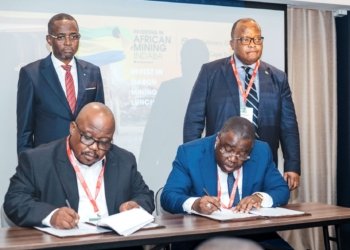ZANZIBAR, Tanzania (BG) – On Sunday, African ministers of justice marked a milestone by adopting the eight annexes of the African Continental Free Trade Area (AfCFTA) Protocol on Digital Trade during the 10th Session of the Specialized Technical Committee on Justice and Legal Affairs (STC and JLA) in Zanzibar, Tanzania.
The AfCFTA will be the largest free trade area since the formation of the World Trade Organization, it encompasses Africa’s current population of more than 1.2 billion, projected to grow to 2.5 billion by 2050, according to the African Union (AU).
The newly adopted annexes address key areas such as rules of origin for digital products, cross-border payments, data transfers, cybersecurity, and emerging technologies.
These will now proceed to the AU Assembly for consideration and adoption by heads of state and government in February 2025.
Preparing Africa for the Fourth Industrial Revolution
“This represents a landmark achievement for the implementation of the AfCFTA, as it positions Africa as the first continent of the world to establish a rules-based regulatory framework for digital trade,” the AfCFTA Secretariat tweeted.
Wamkele Mene, Secretary-General of the AfCFTA, highlighted the transformative potential of the Digital Trade Protocol in a tweet on Saturday:
“As the Protocol on Digital Trade annexes are being considered for submission to the AU Assembly towards their adoption, it is important to acknowledge that this symbolises the conclusion of readiness for the African continent to tackle the challenges of the 4th Industrial Revolution.”
Mene emphasized the protocol’s role in creating a regulatory framework that opens markets and fosters opportunities for small and medium enterprises (SMEs), African technology companies, creative industries, and investments in digital public infrastructure.
Comprehensive Scope of the Digital Protocol
The AfCFTA Digital Protocol, approved by State Party Ministers in February 2024, contains eleven sections addressing market access, data governance, business trust, emerging technologies, and capacity building.
The eight newly adopted annexes provide supplementary provisions, including digital identities and source code disclosure for cybersecurity.
These efforts aim to establish Africa as a unified digital market, promoting inclusivity, innovation, and economic growth across the continent.
Next Steps for Implementation
Once ratified, the protocol will create a framework to facilitate digital trade and attract investments in digital public goods across Africa.
The annexes are expected to boost e-commerce, streamline cross-border transactions, and strengthen data protection measures.
“The implementation of the Protocol will establish a regulatory framework, open markets, foster new opportunities for Small Medium Enterprises, for big African technology companies, for our creative industries and for investment in digital public infrastructure,” Mene added.
A New Era for African Digital Trade
The AfCFTA is a monumental free trade initiative, uniting 55 African Union member states and eight regional economic communities (RECs).
With a population of more than 1.2 billion people and a combined GDP of approximately $3.4 trillion, the AfCFTA is one of the flagship projects of the African Union’s Agenda 2063: The Africa We Want.
Expected benefits of the AfCFTA include increasing intra-African trade, currently at 15-18%, stimulating regional value chains, strengthening African companies’ capacity to access global markets, and bolstering Africa’s economic diplomacy, according to the AU.
The operational phase of the AfCFTA was launched during the 12th Extraordinary Summit of the AU in Niamey on July 7, 2019. The agreement, adopted and opened for signature on March 21, 2018, in Kigali, Rwanda, entered into force on May 30, 2019.
The upcoming AU Assembly will be a pivotal moment for Africa’s digital future as leaders deliberate on formally adopting the annexes to reshape the continent’s digital economy.
















